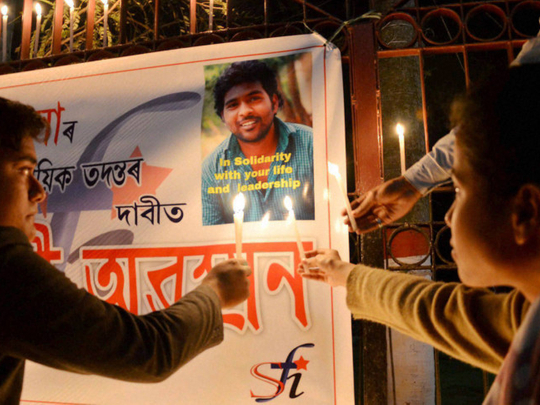
The death of Rohith Vemula, a Dalit (lower caste) student pursuing post-doctoral studies at India’s Hyderabad Central University, has once again reminded us of the ingrained inequality undergirding this supposedly modern state.
Rohith was one of the five members of Ambedkar Students’ Association who had been expelled from the university a fortnight ago. His fault was taking on the student leader affiliated to the ruling Bharatiya Janata Party (BJP). His mistake was he had lived up to the tradition of youth resistance in the country and did not consider his career as the sole objective of his academic pursuit. Apart from being an ambitious social scientist, he also wanted to play the role of a social activist and fight hatred against minorities and other communities, as well as the casteist politics that has forever dominated in Indian society.
Today’s India is being globally advertised as a utopia, seeking the best and brightest in its quest for a place amongst great nations. But it is the same country where a section of the society dictates terms to its ‘much loved’ young citizens in every minuscule aspect of their personal lives. It dictates all their behaviours, from childhood to adult life, and decides their names, which bear resemblance to the religion into which one is born. It tells them who to marry, even if it is a complete stranger, how to raise their children and every act imaginable that a citizen should decide on his or her own in a democratic country. It tells them what to wear, how to wear it and, most importantly, what and whom to support.
Many Indians keep quiet, fearing risks to their lives, careers, property and, most importantly, the lives of their near and dear ones. Their collective cowardice is being exhibited in the country on a daily basis. The very idea of protest against wrongdoing is being rinsed out of society over decades to make the masses a silent advocate of this brutal dystopia. Those who protest are driven towards death. Rohith, unfortunately, was one of the few exceptions who had the courage to oppose Ambedkarite politics, protests beef bans, the persistence of the death penalty in the Indian criminal justice system, and communal violence. Above all, he was a Dalit student, a product of the much-vaunted reservation system that was meant to provide assistance to the underprivileged, but is viewed as a policy that undermines the rightful credence of the upper caste.
Conditional learning
Questions are being raised as to whether he was a Dalit at all. If it is proved he was not, it would purge India’s Minister of Human Resources, Smriti Irani, and her party colleagues of their sins. If he was not a Dalit, his death will not cast a shadow on the pro-Dalit politics of the BJP, bringing much-needed relief to the party’s central leadership. It will ensure that the Congress party vice-president Rahul Gandhi will not have to travel to Hyderabad, relieving him of the responsibilities of an opposition leader that he so hates to perform. It also lessens the pressure on West Bengal Chief Minister Mamata Banerjee of sending her emissary to join the protest as her vote bank will not be affected ahead of the assembly polls in her state.
If they do so, it will also relieve me of the sin of introducing Rohith as ‘a Dalit student’ at the very beginning of this article. The innocuous mention of his caste proves that education has little effect over the conditional learning that Indian society gives us from the moment of birth. It is so easy for us to label a human being by his or her birth, which Rohith aptly described in his heart-rending suicide note as a “fatal accident”.
In India, a large number of people feel threatened a section of the society is forced to bear inexorable inequalities, and many, like Rohith, face a dreadful, iniquitous, precipitated and uncalled-for death.
The reportage by India’s mainstream media is superfluous as it has focused more on politics, ignoring the more poignant part of Rohith’s letter, where he tried to teach all of us a valuable lesson in humanity. “No one has instigated me, whether by their acts or by their words to this act. This is my decision and I am the only one responsible for this. Do not trouble my friends and enemies on this after I am gone,” he wrote.
The bigger question that confronts India is whether there will be an awakening. The answer, frightfully, is no. Remember Jyoti Singh, the girl who was raped in India’s national capital by a bunch of rogues on a moving bus, who later succumbed to her injuries? It seemed like a moment of awakening for the country, but self-centred, modern-day life forced people in India back into their cells. There will be millions of social media comments, lots of hunger strikes, candle-light marches and tearful statements by politicians, but every time, we miss the most important point. For India to change, its people need to change the way they look at their fellow citizens. Indians cannot just brand a human being in terms of his or her caste or gender, but in terms of humanity. Until then, the blood of people like Rohith and Jyoti will be on our hands.
Archisman Dinda is a journalist based in Kolkata, India.











